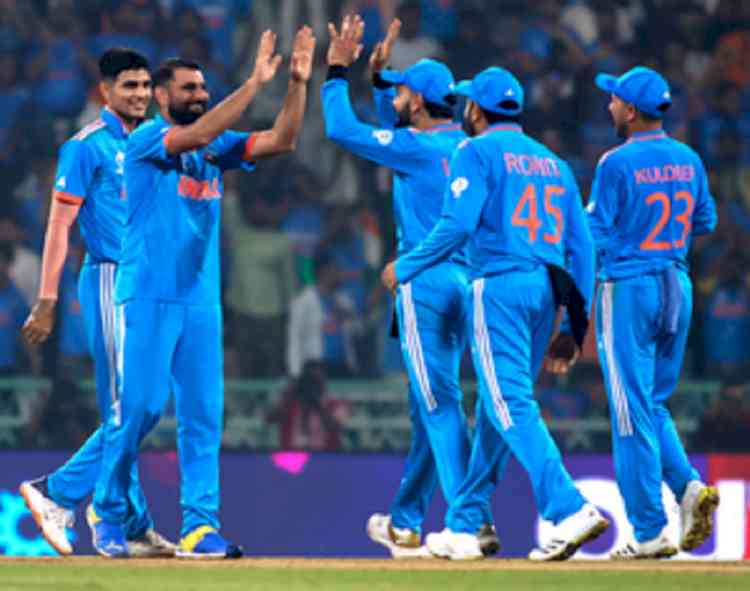Indian bowlers prove their worth under pressure (ASHIS RAY FROM LUCKNOW)
If India win the 2023 ICC ODI World Cup, it will be because of the broad spectrum composition and incisiveness of their bowling.

Ashis Ray
Lucknow, Oct 29 (IANS) If India win the 2023 ICC ODI World Cup, it will be because of the broad spectrum composition and incisiveness of their bowling.
When the batting fails -- as the best of line-ups occasionally do -- bowlers are called upon to rescue the circumstances. This is precisely what India’s leather merchants did as they sent England -- who must have entertained hopes of upsetting India after restricting them to 229/9 -- packing by bundling them out for a paltry 129 inside 35 overs.
Thus, in course of nine meetings between the two countries in the 48-year history of the World Cup, both teams have now won four matches apiece while the encounter in the 2011 edition had ended in a tie.
Quite honestly, it’s difficult to associate cricket with Lucknow. None of the Indian greats of the game have sprouted from this city of courtesy, blooming gardens, classical music and verse and delicious Avadhi cuisine.
But times have changed unrecognisably. Cricket is now a national obsession in India; and has penetrated the farthest nooks and corners of the nation.
And so has sprung in Lucknow’s suburbs in the vicinity of the bending Gomti river a spherical cricket stadium named after an eminent Lucknow Member of Parliament and former Prime Minister, late Atal Bihari Vajpayee. Indeed, a near capacity audience of 46,000 packed the galleries to the rafters.
Thus, in the territory that the British faced the stiffest resistance in the 1857-58 Indian Mutiny - from the people of the kingdom of Avadh, which the colonial rulers had annexed - the English in coloured clothing that typify limited overs cricket encountered the flashing blade of one Rohit Sharma AKA Hitman, not to mention the Indian captain as well.
Albeit on this day he was constrained in his belligerence, especially in the first powerplay of 10 overs, because of partners deserting him.
It was Match Six for both teams in the current World Cup. England are the defending champions, and were among some bookmakers the pre-tournament joint favourites along with hosts India. But after five defeats in six outings, they languish at the bottom of the eliminating league table; their hopes of qualifying for the semifinals virtually extinguished.
On the other hand, India with six straight wins pose a formidable proposition. Yet, the uncertainty of cricket is a remarkable leveller. The down-and-out can in their moment be a force to be reckoned with. And so England’s hitherto underperforming bowlers proved to be against India’s fancied top order batsmen.
The fact that three of the first four Indian batsmen perished after skying the ball suggested there was sometimes a little more bounce in the wicket than during the earlier fixtures at the venue.
The ball grew big on Virat Kohli as he attempted to clear mid-off; while both Shreyas Iyer and K.L. Rahul top-edged – the former playing across and the other stepping out to hit over the top.
Of course, by the time the latter departed, he and Sharma, who judiciously blended aggression with caution, had staged a partial recovery for India with a 91-run partnership for the 4th wicket. The home side was at one stage at a wobbly 40/3.
Sharma gauged the pace and bounce in the pitch -- which was uneven -- better than his fellow batsmen. Anything short, he pulled in a flash. He even danced down the track to the left-arm fast medium David Willey as if he was a slow bowler, hoisting him for a six and a four.
Suryakumar Yadav, popular with the spectators and scribes alike because of his exploits in Twenty20, raises great expectations every time walks to the middle.
His 49 off 47 balls -- with a few typical wristy pyrotechnics -- appeared to be insufficient; but the unquestionable value of playing specialist, wicket-taking bowlers -- as opposed to bits and pieces exponents -- was soon to be reaffirmed.
As for the English bowlers, the quicker ones gathered a greater share of the spoils. Chris Woakes, the best of them in the afternoon, bowled Shubman Gill with a beautiful incoming delivery. But Adil Rashid with his economical yet probing leg-spin and googly collected the most important wicket of Sharma, who picked his wrong ‘un but failed to belt the ball over mid-wicket.
The promising Mohammed Siraj continues to slightly disappoint in the tournament in terms of not etching more scalps. He seems to want to blast a batsman out instead of adhering to the wisdom of line and length.
However, Jasprit Bumrah proved his worth when having to open the bowling in the face of a modest total, while the folly of ignoring Mohammed Shami in earlier matches was laid threadbare yet again. He is notably at the peak of his prowess. His ability to pitch ball after ball on the seam is quite staggering.
(Senior cricket writer Ashis Ray is a broadcaster and author of the book 'Cricket World Cup: The Indian Challenge')
--IANS
ashis/arm


 IANS
IANS 








